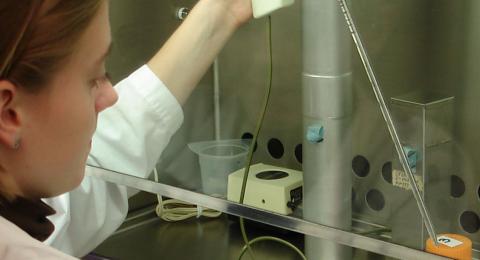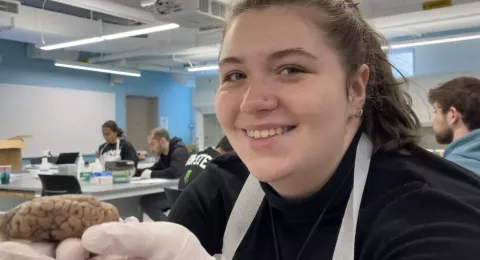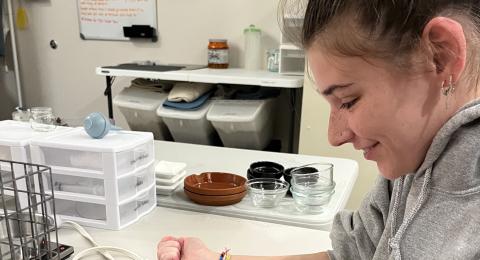Studying Neuroscience and Behavior at UNH immerses you in the exploration of the brain and its role in shaping behavior. This interdisciplinary major blends biology, psychology and cognitive science, allowing you to investigate the connections between neural processes and behavioral outcomes. With hands-on research and lab experiences, you will develop critical thinking and analytical skills essential for understanding complex neurological and psychological phenomena. This major appeals to curious, detail-oriented students who are passionate about unraveling the mysteries of the brain.
What is neuroscience and behavior?
Neuroscience and behavior is a multidisciplinary field that seeks to understand the complex relationship between the nervous system and behavior in humans and other animals. Although our understanding of the connection between nervous system function and behavior is increasing rapidly, there is still much to discover about the brain and sensory systems in general and how they influence human development, reproduction, cognition, memory and learning, stress, attention control and more. The importance of understanding animal behavior, including foraging and mating decisions, communication, parental care, predation avoidance, migratory behavior, and response to anthropogenic impacts is equally important considering the rapidly changing environment.
Why study neuroscience and behavior at UNH?
The B.S. degree in neuroscience and behavior (NSB) is a great way for students to combine interests in neurobiology and human/animal behavior. NSB students engage in hands-on laboratory research with our psychology and biology faculty, gaining valuable experience with cutting-edge equipment and techniques. Our research facilities include nine on-campus research labs, including the Integrative Animal Behavior and Ecoacoustics Laboratory and the Confocal Imaging Center, along with off campus research sites such as the Jackson Estuarine Lab, the Coastal Marine Lab, and the Shoals Marine lab. The program’s progressive curriculum, award-winning faculty and opportunities for hands-on research prepare students for success in both post-graduate degree programs and the workplace.
Potential careers
- Animal-assisted therapist
- Animal scientist
- Behavior specialist
- Higher education faculty
- Medical doctor
- Neuropsychologist
- Pharmaceutical researcher
- Physician's assistant
- Research technician
- Veterinarian
- Wildlife and fisheries manager
Curriculum & Requirements
The major in neuroscience and behavior (NSB) offers an interdisciplinary approach to human and non-human behavior, focusing on the evolution and adaptiveness of certain behaviors, as well as their underlying neural mechanisms. Students who have always been fascinated by how the brain functions will be well served by this major, as will those who love wild animals and wish to better understand their behavior. The B.S. in neuroscience and behavior is based on a solid foundation in biology, chemistry, physics, statistics, and genetics (foundation courses). These are followed by a two-semester course sequence that covers the fundamentals of neuroscience and behavior. Students can then pick five or more electives focusing on areas of interest.
NSB students are encouraged to take advantage of research experiences in the laboratories of the psychology and biology faculty in the program. This provides valuable experience with cutting-edge equipment and techniques. Some students may share aspects of a larger project, whereas others may be relatively independent and design their own project under supervision. In either case, important skills are gained by the discipline of gathering data, analyzing and interpreting it, and presenting it to a broader audience.
The curriculum provides most of the requirements and recommended courses for students seeking admission to graduate school and to professional schools in medicine and veterinary medicine. Students who might choose not to go on to advanced degrees are well-prepared for employment as skilled technicians in research laboratories or, if their interests are in animal behavior, as field research assistants or animal trainers. With additional courses in education, the B.S. in NSB also qualifies graduates to teach at the elementary, junior high, and high school levels.
Faculty participating in the NSB major combine a love of teaching and student mentoring with a passion for research, and encourage student participation. Research facilities that students can use include the Integrative Animal Behavior and Ecoacoustics laboratory, the confocal imaging center, the Hubbard Center for Genomic Studies, and the many marine, freshwater, and estuarine laboratories associated with UNH programs. Students can also take summer courses at the Shoals Marine Laboratory.
Sample Degree Plan
This sample degree plan serves as a general guide; students collaborate with their academic advisor to develop a personalized degree plan to meet their academic goals and program requirements.
| First Year | ||
|---|---|---|
| Fall | Credits | |
| BIOL 411 | Introductory Biology: Molecular and Cellular | 4 |
| CHEM 403 | General Chemistry I | 4 |
| NSB 400 | Topics Neuroscience & Behavior | 1 |
| ENGL 401 | First-Year Writing (or Discovery Course) | 4 |
| Discovery Course | 4 | |
| Credits | 17 | |
| Spring | ||
| BIOL 412 | Introductory Biology: Evolution, Biodiversity and Ecology | 4 |
| CHEM 404 | General Chemistry II | 4 |
| BIOL 528 or PSYC 402 | Applied Biostatistics I or Statistics in Psychology | 4 |
| ENGL 401 | First-Year Writing (or Discovery Course) | 4 |
| Credits | 16 | |
| Second Year | ||
| Fall | ||
| NSB 500 & NSB 501 | Fundamentals of Neuroscience and Behavior I and Fundamentals of Neuroscience and Behavior I Laboratory | 5 |
| NSB Elective 1 | 4 | |
| GEN 604 or PHYS 401 | Principles of Genetics or Introduction to Physics I | 4 |
| Discovery Course | 4 | |
| Credits | 17 | |
| Spring | ||
| NSB 502 & NSB 503 | Fundamentals of Neuroscience and Behavior II/Systems Neuroscience and Fundamentals of Neuroscience and Behavior II Laboratory | 5 |
| NSB Elective 2 | 4 | |
| GEN 604 | Principles of Genetics | 4 |
| Discovery Course | 4 | |
| Credits | 17 | |
| Third Year | ||
| Fall | ||
| CHEM 545 & CHEM 546 | Organic Chemistry and Organic Chemistry Laboratory (or Spring) | 5 |
| NSB Elective 3 | 4 | |
| Discovery/Elective Course | 4 | |
| Discovery/Elective Course | 4 | |
| Credits | 17 | |
| Spring | ||
| BMCB 658 & BMCB 659 | General Biochemistry and General Biochemistry Lab (or SR Fall) | 5 |
| NSB Elective 4 | 4 | |
| Discovery/Elective Course | 4 | |
| Discovery/Elective Course | 4 | |
| Credits | 17 | |
| Fourth Year | ||
| Fall | ||
| NSB Elective 5 | 4 | |
| PHYS 401 | Introduction to Physics I | 4 |
| Discovery/Elective Course | 4 | |
| Discovery/Elective Course | 4 | |
| Credits | 16 | |
| Spring | ||
| Discovery/Elective Course | 4 | |
| Discovery/Elective Course | 4 | |
| Discovery/Elective Course | 4 | |
| Discovery/Elective Course | 4 | |
| Credits | 16 | |
| Total Credits | 133 | |
Degree Requirements
All Major, Option and Elective Requirements as indicated.
*Major GPA requirements as indicated.
Major Requirements
- Students majoring in NSB are required to take foundation courses in basic science, core courses, and five electives from an extensive list of courses, including some offered by other departments including biochemistry, molecular and cellular biology, and natural resources.
- Minimum grade of D- or better is required in CHEM 403, CHEM 404, CHEM 545/CHEM 546, and PHYS 401; minimum grade of C- or better is required in all other courses.
- A capstone experience is required. This may be independent research, an advanced seminar, or other special student activity. It is meant to integrate prior experience and take the student to a new level in an area of special interest.
| Code | Title | Credits |
|---|---|---|
| Foundation Courses | ||
| NSB 400 | Topics Neuroscience & Behavior | 1 |
| BIOL 411 & BIOL 412 | Introductory Biology: Molecular and Cellular and Introductory Biology: Evolution, Biodiversity and Ecology (2 semesters) | 8 |
| CHEM 403 & CHEM 404 | General Chemistry I and General Chemistry II (2 semesters) | 8 |
| CHEM 545 & CHEM 546 | Organic Chemistry and Organic Chemistry Laboratory | 5 |
| BMCB 658 & BMCB 659 | General Biochemistry and General Biochemistry Lab | 5 |
| PHYS 401 | Introduction to Physics I | 4 |
| PSYC 402 | Statistics in Psychology | 4 |
| or BIOL 528 | Applied Biostatistics I | |
| GEN 604 | Principles of Genetics | 4 |
| NSB 500 & NSB 501 | Fundamentals of Neuroscience and Behavior I and Fundamentals of Neuroscience and Behavior I Laboratory | 5 |
| NSB 502 & NSB 503 | Fundamentals of Neuroscience and Behavior II/Systems Neuroscience and Fundamentals of Neuroscience and Behavior II Laboratory | 5 |
| Electives | ||
| Select five courses from the following: | 20-22 | |
BIOL 541W | Ecology | |
BIOL 714W | Model Organisms in Biological and Medical Research | |
BIOL 775 | Plant Rx | |
BMCB 605 | Principles of Cell Biology | |
BMCB 760 | Pharmacology | |
BMS 507 & BMS 508 | Human Anatomy and Physiology I and Human Anatomy and Physiology II 1 | |
BMS 702 | Endocrinology | |
BMS 711 | ||
BMS 718 | Mammalian Physiology | |
COMM 798 | Special Topics (C) | |
GEN 706 | Human Genetics | |
KIN 706 & KIN 707 | Neurology and Neurology Lab 1 | |
MEFB 714 | Field Animal Behavior (SML, C) | |
NSB 727 | Animal Communication (C) | |
PHIL 630 | Neuroscience and Philosophy | |
PSYC 511 | Sensation and Perception | |
PSYC 512 | Psychology of Primates | |
PSYC 513 | Cognitive Psychology | |
PSYC 521 | Behavior Analysis | |
PSYC 710 | Visual Perception (C) | |
PSYC 720 | Animal Cognition (C) | |
PSYC 731 | Brain and Behavior (C) | |
PSYC 733 | Drugs and Behavior (C) | |
PSYC 735 | Neurobiology of Mood Disorders (C) | |
PSYC 736 | Attention Disorders (C) | |
PSYC 741W | Special Topics (C) (Approved topics only see footnote) 1 | |
ZOOL 613W | Animal Behavior | |
ZOOL 625 & ZOOL 626W | Principles of Animal Physiology and Animal Physiology Laboratory 2 | |
ZOOL 690 | Evolution | |
ZOOL 726 | Conservation Behavior (C) | |
ZOOL 733W | Behavioral Ecology (C) | |
ZOOL 736 | Genes and Behavior (C) | |
ZOOL 740 | Acoustic Ecology (C) | |
ZOOL 777W | Neuroethology (C) | |
795/796 or 799 Independent Study, (C) 3 | ||
| Capstone | ||
| Select from the following options: 4 | ||
1.) Complete a Capstone designated course (C) from above | ||
2.) One semester of Capstone Research: | ||
BIOL 795 | Independent Investigations in Biology | |
or PSYC 795 | Independent Study | |
or INCO 790 | Advanced Research Experience | |
3.) Honor's Thesis: | ||
NSB 799H | Honors Senior Thesis | |
or BIOL 799H | Honors Senior Thesis | |
or PSYC 797 | Senior Honors Tutorial | |
or PSYC 799 | Senior Honors Thesis | |
4.) Advisor approved alternative | ||
| Total Credits | 69-71 | |
- 1
Must be one of the following approved topics: Fundamentals of Substance Abuse, Neurobiology of Spatial Cognition, Fundamentals of Cognitive Science, Neuroscience of Memory, Behavioral Neuroscience, or Science of Daydreaming.
- 2
Both must be taken to count as one of the 5 required major electives
- 3
One experience totaling at least 4 credits, but can be earned over the course of two consecutive semesters provided the experience is with the same research mentor. Can only substitute for one elective.
- 4
Courses that are eligible to fulfill the Capstone requirement are indicated with a (C) and must be taken senior year. You can: 1) designate a course as a Capstone course, with additional requirements as determined by the instructor; 2) complete one semester of Capstone Research course 3) do an honors thesis in Neuroscience and Behavior or Biology or Psychology or; 4) participate in an alternative activity with approval from the student’s academic advisor.
Discovery Program Requirements
NSB majors may use BIOL 411, BIOL 412, CHEM 403, CHEM 404, PHYS 401, PHYS 407 and either PSYC 402 or BIOL 528 to fulfill the Biological Sciences, Physical Sciences, Discovery Lab, and Quantitative Reasoning Discovery requirements.
Additional Information
Students transferring into the NSB program from other UNH majors must hold a cumulative GPA of at least 3.2 at the time of requested major change.
Program Learning Outcomes
Students demonstrate that they understand basic principles of neuroscience and behavior.
- Apply the core principles of biology, chemistry, physics, and statistics to more advanced concepts in neuroscience and behavior.
- Apply the principles of evolution and genetics to understand how genotype and phenotype affect the structure and function of animal nervous systems and behavior.
- Describe the basic features of animal nervous system development, organization, signaling, integration, and higher-level processing, and how these are altered in diseases of the nervous system.
- Explain the four levels of analysis emphasized in modern animal behavior research: causation, development, function, and evolution.
- Describe molecular and cellular approaches to the study of brain structure, function, and development, as well as behavioral and cognitive neuroscience approaches to studying higher level brain functions.
Students demonstrate that they can undertake scientifically valid methods of inquiry.
- Apply appropriate research methods, laboratory techniques, and statistical methods to investigate scientific questions in neuroscience and behavior.
Students demonstrate that they can think critically and analytically.
- Read and critique primary research literature related to the nervous system, how nervous system function generates behavior, and how behavior addresses fitness-related challenges across a diversity of species.
Students demonstrate that they can communicate effectively.
- Demonstrate scientific writing skills, and proficiency in delivering oral presentations related to both the primary literature and findings from student investigations in neuroscience and behavior.
- Students practice science responsibly and ethically, and acknowledge the influence of cultural and historical biases in the sciences.
Explore Program Details
Thanks for your interest in the Neuroscience and Behavior (NSB) program at UNH! We hope this document answers most of your questions, but feel free to direct others to unh.nsb@unh.edu.
The Neuroscience and Behavior (NSB) is an interdisciplinary program that is co-coordinated by the Dept. of Biological Sciences and the Dept. of Psychology. It is for students interested in neuroscience, animal behavior, and human behavior from a biological perspective.
Not at all! The requirements and the experience are the same regardless of your College. There are NSB students in both Colleges because the Dept. of Psychology is in COLA and the Dept. of Biological Sciences is in COLSA.
Absolutely, and many NSB students are. There is a significant overlap between the requirements of the major and those of numerous post-graduate programs, including medical and veterinary school. The NSB major was designed with the understanding that many of our students go on to pursue these degrees.
Many of our students pursue post-graduate programs, such as medical or veterinary school (described above), Master’s, Ph.D., physician’s assistant, optometry, Pharm.D., nursing and dental programs. Others take industry jobs, such as with biotech firms or pharmaceutical companies.
Many students, particularly very recent graduates, pursue research experiences. The settings of these experiences can range from medical research facilities to field research on wild populations, from government organizations to non-profits to private firms. Still, others find positions doing animal training or care, wildlife management, or environmental education. This is only a sample of what NSB alumni are doing!
Yes! It is not a requirement, but we encourage it and many do because it is one of our program’s (and our University’s!) greatest strengths. We offer students numerous opportunities to participate in research, beginning as early as freshman year if a student wishes. Whether you want to work in a laboratory or outside studying wild populations, we can accommodate you! Student research is typically showcased at UNH’s Undergraduate Research Conference in the spring.
Definitely, and many NSB students do. The NSB major was designed to be flexible and accommodating, and the NSB faculty are fully supportive of pursuing other educational opportunities such as studying abroad. With proper discussions with your Academic Advisor, this can easily be worked into the NSB curriculum.
Like studying abroad, we support you in pursuing other academic interests, and the NSB major leaves plenty of room for completing a minor. Some NSB students minor in something related to the NSB major, such as Psychology, and others minor in unrelated fields, such as a foreign language or fine art.
Yes—the NSB major is fundamentally a science major, and laboratory courses give students hands-on experience that strengthens students’ understanding of the material.
There are typically around 160 NSB students—it is a popular and growing major!
Yes: for all UNH majors, there is an Honors-in-Major option. UNH also offers a University Honors Program.
It depends on which AP courses and what your exam scores are. There are options for fulfilling statistics, physics, and some chemistry requirements with certain AP exam scores. NSB students rarely do this, because it severely limits your postgraduate degree options and may leave you feeling unprepared in upper-level classes. AP Biology credits may not be used to place out of the introductory biology courses.
Aside from differences in the courses students take and the material covered, the NSB program’s greatest strengths are its flexibility, its interdisciplinary nature, and its opportunities for experiential learning. You can tailor the major to your interests and career goals through your choice of electives, and there is plenty of room for fulfilling additional requirements for postgraduate programs, studying abroad, and completing a minor.
Having faculty from four departments (Biological Sciences, Psychology, Communication Sciences & Disorders, and Medical, Cellular, & Biomedical Sciences) provides NSB students with an incredible range of perspectives, advising, and research/learning opportunities. Regardless of whether you participate in undergraduate research for four years, opt not to do it at all, or something in between, the NSB major will give you hands-on experience and skills that you can take with you far beyond UNH.
To earn honors-in-major in Neuroscience and Behavior, a student must:
- Submit the NSB Honors-in-Major APPLICATION form to the NSB Honors Liaison (should be completed before taking NSB electives for honors credit).
- Maintain a grade point average of at least 3.5 in major coursework.
- Take at least three courses for honors credit and achieve at least a B in all of them. These three courses must meet the following criteria:
- They must be 600- or 700-level.
- They must fulfill a requirement for the NSB major.
- At least two must come from the list of NSB electives (not foundation courses).
- They may not include independent studies, thesis, or other research experience.
- For each course taken for honors credit, the student will completeseparate assignments, such as additional projects, papers, or discussion sections, at the discretion of the instructor.
- Successfully complete NSB 799H Senior Thesis. The student will enroll in 2-4 NSB 799H credits for two consecutive semesters (for a total of 4-8 credits), with an IA grade given for the first semester.
- No later than the beginning of the first semester, senior year, each student participating in Senior Thesis will meet with his/her faculty advisor to select a research project. The student will present a written proposal for evaluation.
- During the year, the student will carry out the experimental portion of his/her research under the tutelage of the advisor. The advisor must be either NSB core or affiliated faculty.
- Earn a total of at least 16 honors credits. These credits may include both the three courses and the thesis.
- Email a digital copy of the completed thesis (as one single PDF document) to the NSB Honors Liaison by May 10 for May graduates and December 10 for December graduates.
- Submit the NSB Honors-in-Major VERIFICATION form to the NSB Honors Liaison (should be completed during the beginning of the final semester).
With additional Honors credits and Discovery courses, students can also graduate with Honors in Discovery and/or Interdisciplinary Honors. If you have questions about your particular honors course of study, please contact the NSB Honors Liaison.
Advising is available for UNH students, alumni, and post baccalaureates pursuing health professional careers.
The Pre-Health Advising Office provides support throughout the process of preparing for health professions school from advising on the courses they should take to helping navigate through the complex steps of the application process.
Register with Pre-Professional Health Office
The Capstone must be taken during the senior year or after 90 credits have been taken.
Students interested in the Neuroscience and Behavior major may also be interested in the following advanced degrees at UNH. Students in the program also have the opportunity to participate in the UNH accelerated master’s program.
















